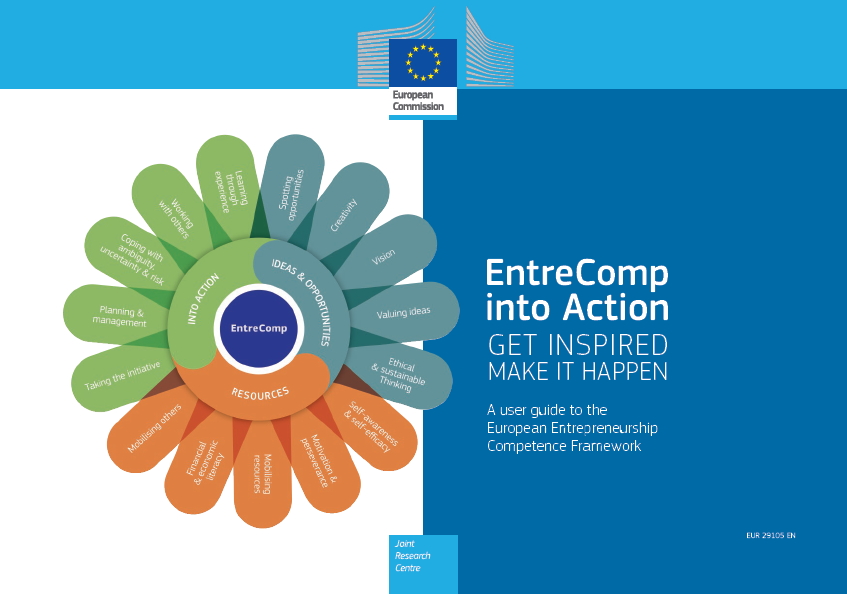Entrepreneurship Education
The idea of entrepreneurship is strongly related to self-empowerment and to individual initiative. It's clearly related to gaining value, often through putting a business idea into practice. But in a broader sense entrepreneurship can be seen as any activity with a clear "value" - or in the language of the social sphere - "impact":
"Entrepreneurship is when you act upon opportunities and ideas and transform them into value for others. The value that is created can be financial, cultural, or social."[1]
Contents
A roof term for different approaches toward agency and entrepreneurs
In a narrower sense entrepreneurship education is the roof term which unites so different approaches like stock-exchange simulation games, school companies, teaching economical skills, or social entrepreneurship. The last one is a hybrid field within the non-profit sector of a society and maybe the most natural connection of the idea of civil involvement withbecoming an econmical entepreneur: "Social entrepreneurship can take the form of a social enterprise, an entrepreneurial structure which foresees profit making, but unlike a business structure, is not profit maximizing. It spends the profit on statutory purposes."[2]
Competency: Taking initiative and putting plans into practice
Entrepreneruship is addressing transversal competencies of individuals. If someone is a community organizer, youth leader, single activist or an entrepreneur, all of these different people require the competency to take initiative, to put plans into practice and the methodlogy how to do this under the concrete circumstances. This leads to the conclusion, that a lot of the skills, attitudes and knowledge addressed through entreprenership education is similarily addressed through some approaches of active citizenship education or through activism in civil society groups.
The EU Entrepreneurship Competency Framework defines entrepreneurship competence as:
Entrepreneurship Competence |
||
|
Transforming ideas and opportunities... |
by mobilising resources... |
into action |
|
|
|
What is specific about entrepreneurship education?
- Entrepreneurial learning is accepting money as a medium for social interaction. Some educators emphasize on solid business plans, some are taking as well collective economical forms into consideration, like cooperatives or commons. Entrepreneurial education would not in general criticize the existence of capital or resources as one influential medium of social life.
- Entrepreneurial education is focusing on services or products. Some activities within citizenship education are as well clearly centered around a project or a concrete activity. However, other social activities are ongoing, steady and following a fundamental different logic of participation.
- Entrepreneruship education prepares people for specific challenges of being an entrepreneur. In fact running businesses is exposing people to monetary risks and requires specific skills, such as responsibility for assets, accepting responsibility for liabilities, ability to deal with the opportunity costs.[4]
- The idea of entrepreneurship is putting emphasis on indivual competency building and gives the personality of the entrepreneur special attention. Usually Entrepreneurship Education is less supporting the idea of collective action.
- Therefore, the idea of competitiveness and of competition is strengthened. Collaboration with others is often understood as outcome-related, intentional activity. In contrast, education emphasizing on community building and on collective impact seeks to emphasize on the quality of collaboration.
- The organisation of activities is goal-related and related to the intention of the owner(s). In contrast, other approaches emphasize on the ethical aspects of social organization - building fair, democratic, inclusive, transparent and participatory institutions. Ownership is here a fluid category.
- The social goal of entrepreneurship is the entrepreneurial activity, not necessarily in its social impact or its social business model. Therefore, social entrepreneurship takes care to integrate a social reinvestment and/or a socially relevant product/service into business models.
However, economical models are in themselves very different. It would be misleading to reduce the entrepreneurship education on the business plan development for small enterprises. In fact there much more actors. In example, cooperatives, non-monetary alternative models for the exchange of goods, commons or social entrepreneurship. In this sense entrepreneurial education should have the goal to show and use the whole range of economical models for offering solutions most fitting to its context and the needs and skills of its learners.
Furthermore, entrepreneurial thinking is not the only way to tackle unemployment through education. In fact, the key competencies of becoming active, taking initiative or even get in touch with economical thinking can be reached through very different approaches: "small business creation is only one possible way of addressing the problem of youth unemployment. Other ways include assisting striving enterprises, supporting them to employ young people, encouraging young people’s participation in alternative business models such as cooperatives, mutual associations, or ensuring their voices are heard in trade unions, etc."[5]
Example: the Potential of Entrepreneurial Thinking for Social Transformation
An inspiring approach from transformational countries concludes, that Entrepreneurship Education can be a complementary element for citizenship education. Or in the words of EcoVisio, an NGO in Moldova:
"Many [people] do not see any future here, because of the lack of economic opportunities and a feeling of powerlessness to create them themselves. Some despair, others are more optimistic and actively engage in civil society activities. However, they are often faced with a conflict - either they contribute to improving the situation, or earn money. Here, social entrepreneurship (SE) comes to aid, enabling them to combine these two purposes and to create a sustainable future at home."
In this sense Entrepreneurship Education is whether simple capitalistic propaganda nor is it claiming to be a substitute for civic participation. It can be seen as an educational tool that leads to more opportunities in the civil society and opens the mind for sustainable forms of engagement beyond NGOs or informal groups.
Source: EcoVisio Website
References
- ↑ FFE-YE. (2012). Impact of Entrepreneurship Education in Denmark -2011. In L. Vestergaard, K. Moberg & C. Jørgensen (Eds.). Odense: The Danish Foundation for Entrepreneurship -Young Enterprise.
- ↑ Tetiana Katsbert in: Pantea, Diroescu, Podlasek-Ziegler; p. 104
- ↑ Margherita Bacigalupo, Panagiotis Kampylis, Yves Punie, Godelieve Van den Brande EntreComp: The Entrepreneurship Competence Framework; European Union, 2016; p. 12
- ↑ Maria-Carmen Pantea, Raluca Diroescu, Maria Podlasek-Ziegler: Young People, Entrepreneruship & Non-formal Learning: A Work in Progress; SALTO-Youth Participation Resource Center; p. 38
- ↑ Maria-Carmen Pantea in: Pantea, Diroescu, Podlasek-Ziegler; p. 46
EntreComp into Action - Get inspired, make it happen
M. Bacigalupo, E. Mc Callum, R. Weicht, L. Mc Mullan, A. Prison, E . Alison
Young People, Entrepreneurship & Non-formal Learning: A Work in Progress
Editors: Maria-Carmen Pantea, Raluca Diroescu, Maria Podlasek-Ziegler






